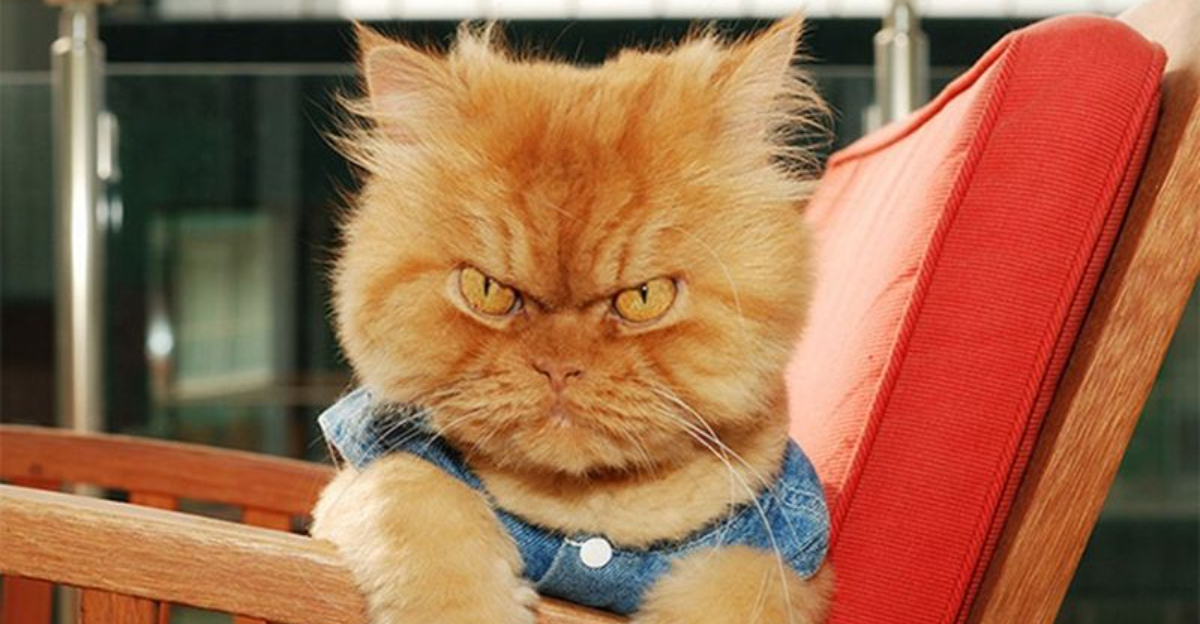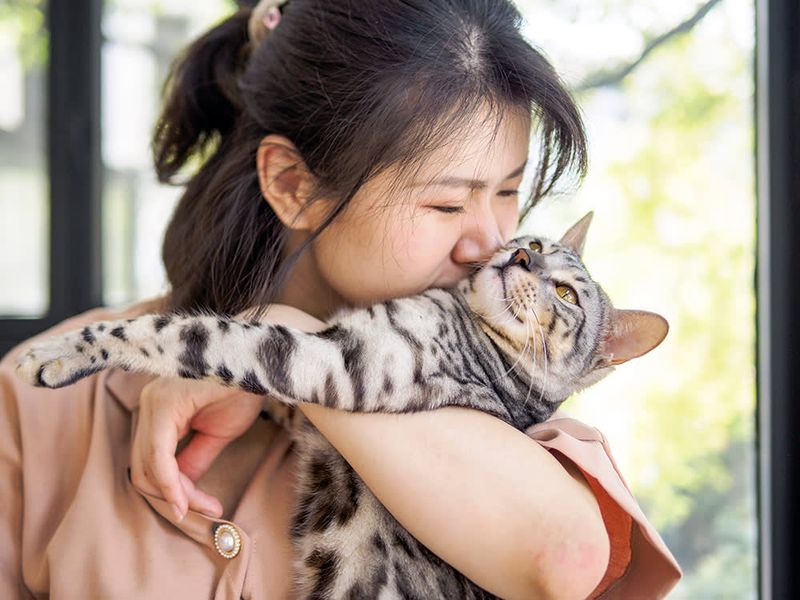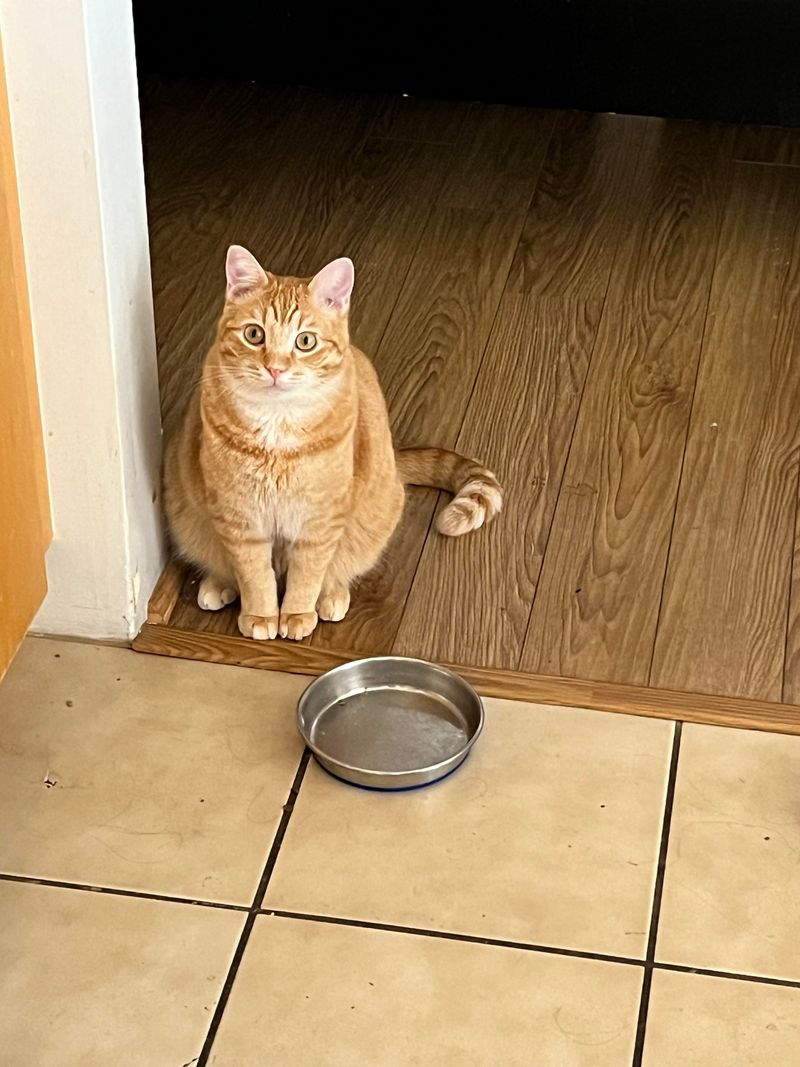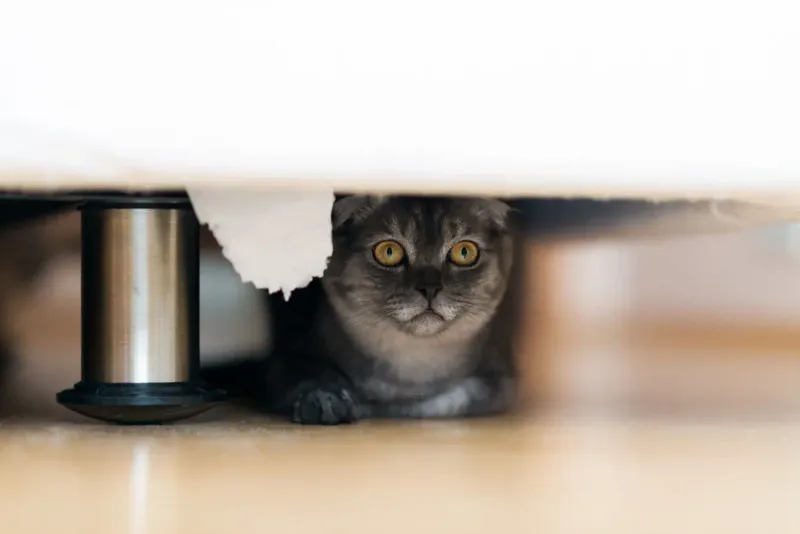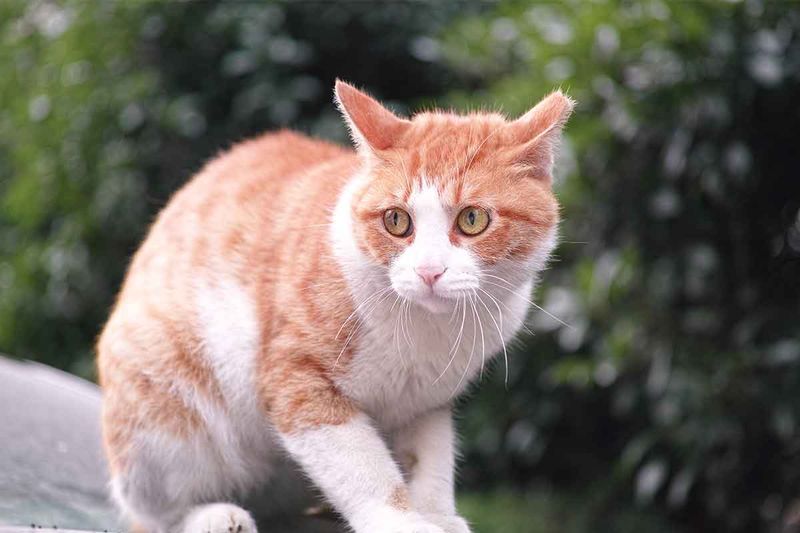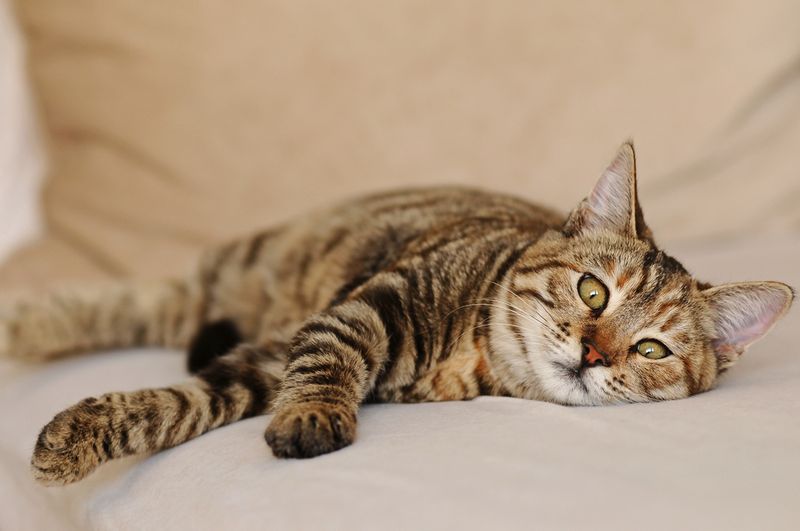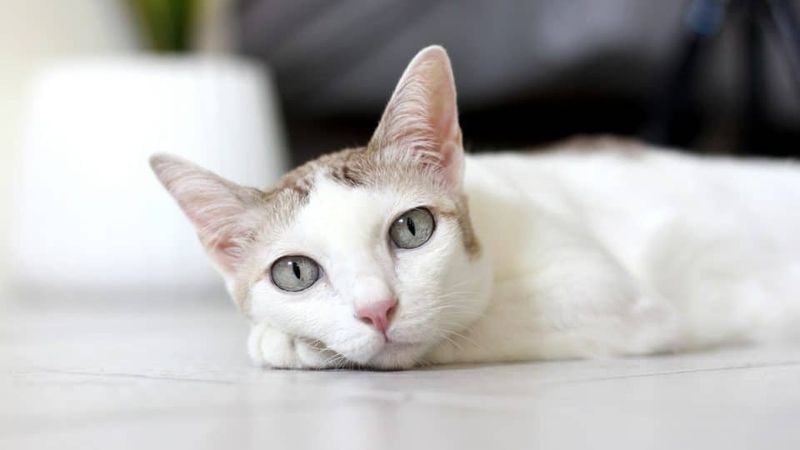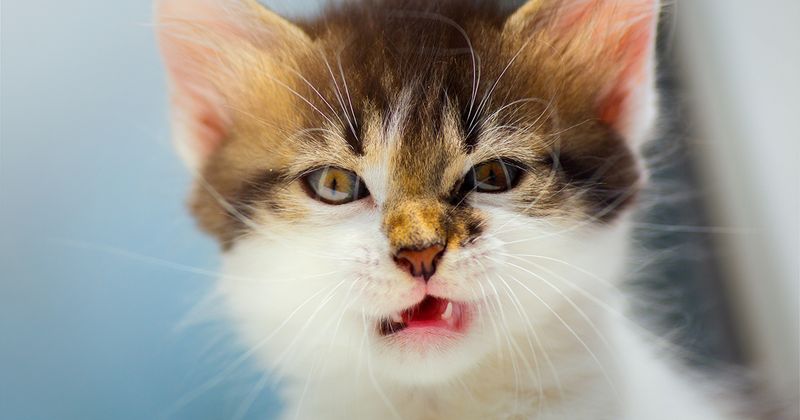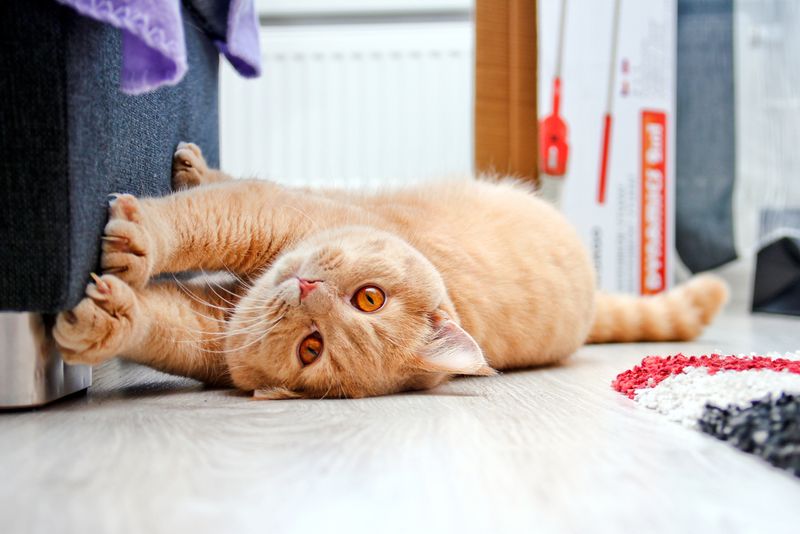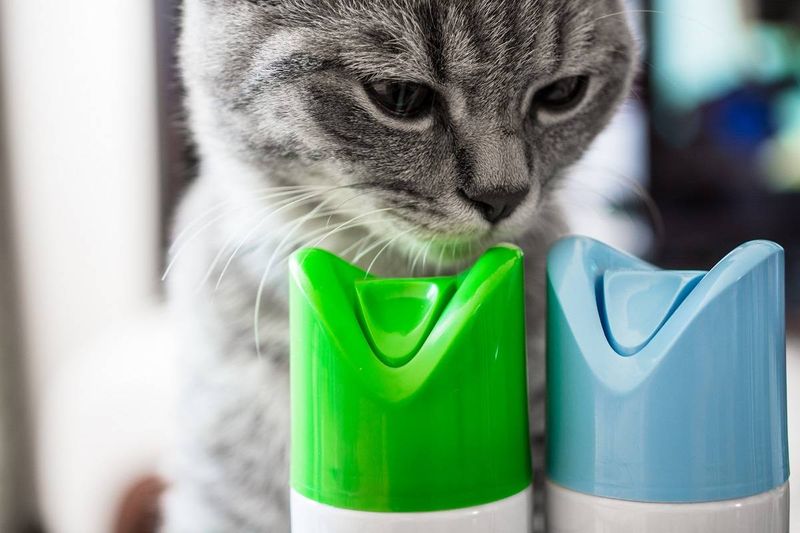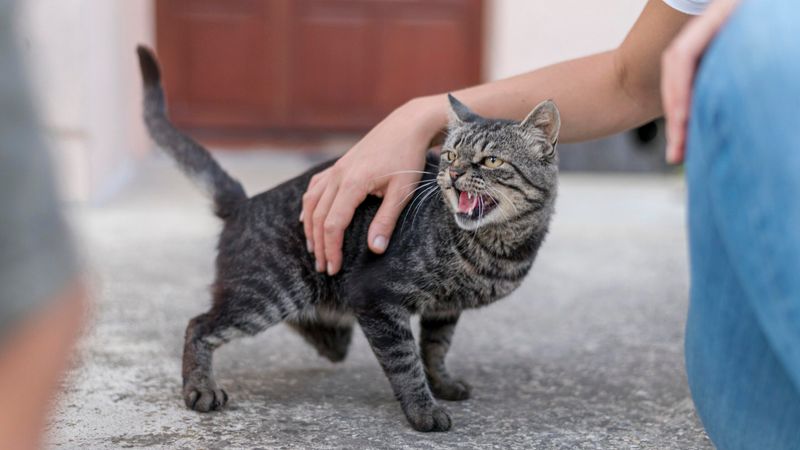📖 Table of Content:
- 1. Forced Cuddle Sessions
- 2. Inconsistent Feeding Times
- 3. Loud Music and Sudden Noises
- 4. Staring Contests
- 5. Rearranging Furniture Without Warning
- 6. Ignoring Litter Box Cleanliness
- 7. Baby Talk and Nickname Overload
- 8. Disrupting Nap Time
- 9. Skipping Playtime
- 10. Bringing Home Strong Scents
- 11. Unexpected Visitors in Their Territory
- 12. Misreading Body Language Signals
- 13. Forcing Them to Wear Costumes
Cats may seem aloof and independent, but they definitely have opinions about our behavior. Those judging eyes aren’t just for show – your feline friend is silently critiquing your every move. Whether you’re squeezing them too tightly or disrupting their carefully planned nap schedule, cats have a long list of human habits they find absolutely unbearable. Here’s what your furry roommate wishes you’d stop doing immediately.
1. Forced Cuddle Sessions
Cats decide when affection happens – not you. Grabbing your cat for an unwanted hug session ranks high on their list of human offenses. They value their personal space and prefer to initiate contact on their terms.
Your furball might tolerate the occasional squeeze, but they’re secretly plotting revenge while you’re smothering them with love. Watch for telltale signs of annoyance: flattened ears, twitching tail, or that famous death stare.
Instead, let your cat come to you. When they do seek attention, reward them with gentle pets in their favorite spots – usually under the chin or behind the ears.
2. Inconsistent Feeding Times
Felines thrive on routine and consider mealtime sacred. When breakfast arrives at 7 AM one day and noon the next, your cat’s internal schedule gets completely thrown off. The confusion leads to excessive meowing, pacing, and that judgmental stare you know all too well.
Cats actually experience stress when their feeding routine changes. Their bodies prepare to receive food at specific times by releasing digestive enzymes and hormones.
Setting up an automatic feeder can help maintain consistency even when your schedule changes. Your cat will appreciate the reliability, and you’ll enjoy fewer early morning wake-up calls demanding breakfast.
3. Loud Music and Sudden Noises
Those sensitive ears aren’t just for show – cats can hear frequencies up to 64 kHz (compared to our measly 20 kHz). Your favorite bass-heavy music or sudden volume spikes on the TV might as well be torture devices to your sensitive companion.
Loud noises trigger your cat’s fight-or-flight response, causing unnecessary stress. That’s why they bolt from the room when you crank up the volume or start the vacuum cleaner.
Try to maintain a relatively quiet home environment, especially in areas where your cat likes to relax. Consider creating a designated quiet zone with their bed and toys where they can escape when things get too noisy.
4. Staring Contests
Locking eyes with your cat might seem like a bonding moment, but in feline language, it’s actually a challenge or threat. Direct, unblinking eye contact signals aggression in cat communication.
Your kitty finds these human staring sessions confusing and uncomfortable. Notice how they often look away or slowly blink when you gaze at them too intensely? That’s them trying to defuse what they perceive as tension.
Show affection the way cats prefer – with slow blinks instead of stares. Cat behaviorists call this the “kitty kiss.” When your cat gives you slow blinks back, they’re expressing trust and contentment, not plotting your demise.
5. Rearranging Furniture Without Warning
To your cat, home is more than just walls and furniture — it’s a familiar path they’ve carefully memorized. When you rearrange things, it disrupts the routes they trust, especially in the dark when they move by feel. What seems small to you can feel unsettling to them.
When you suddenly move that couch or bookshelf, your cat might become disoriented or even anxious. They depend on familiar landmarks to feel secure in their environment.
If you must redecorate, do it gradually rather than all at once. Introduce your cat to the new arrangement by placing treats around the changed area. This helps them create positive associations with the updated layout and rebuild their mental map.
6. Ignoring Litter Box Cleanliness
Proudly pristine by nature, cats spend hours grooming themselves each day. So when their litter box isn’t clean, it’s like asking them to use a bathroom at a gas station — hard pass.
A dirty litter box isn’t just unpleasant – it’s a serious offense in your cat’s mind. Many inappropriate elimination issues stem directly from neglected litter boxes. Your cat isn’t being spiteful when they avoid a dirty box; they’re simply seeking cleaner alternatives.
Scoop the box at least once daily and change the litter completely every 1-2 weeks. Consider using unscented litter, as many cats dislike artificial fragrances that we humans find pleasant.
7. Baby Talk and Nickname Overload
That high-pitched “who’s my fluffy-wuffy kitty-witty” voice might entertain you, but your dignified cat finds it patronizing. Contrary to popular belief, adult cats don’t respond better to baby talk – they actually prefer normal, calm tones.
Cats recognize their names and consistent commands, becoming confused when you use different nicknames constantly. While they won’t understand the specific words, they do pick up on your tone and consistent sounds.
Speak to your cat in a normal voice and stick with one or two consistent names. They’ll appreciate the respect and respond better to commands when you’re not constantly changing what you call them. Your cat prefers being treated like the majestic creature they know they are.
8. Disrupting Nap Time
Cats sleep 12-16 hours daily for good reason – they’re conserving energy for hunting and play. When you wake them for a cuddle or photo opportunity, you’re interrupting important rest cycles that their bodies require.
During deep sleep, cats process information and restore energy. Constant interruptions can lead to a cranky, stressed kitty who might express frustration through unwanted behaviors like excessive meowing or aggression.
Let sleeping cats lie whenever possible. If you must wake them, do it gently with soft sounds rather than touching them suddenly. A startled awakening triggers their fight-or-flight response and can damage the trust between you.
9. Skipping Playtime
Regular play sessions aren’t optional extras – they’re essential for your cat’s physical and mental health. Domestic cats still possess strong hunting instincts that need appropriate outlets. Without regular play, these natural behaviors may manifest as aggression or destructive habits.
Your feline companion gets frustrated when their energy has nowhere to go. Even independent cats who seem disinterested in toys still need environmental enrichment and interaction.
Schedule at least two 10-15 minute play sessions daily using interactive toys that mimic prey movements. Wand toys, laser pointers (used responsibly), and puzzle feeders can help satisfy their hunting instincts while strengthening your bond.
10. Bringing Home Strong Scents
Your cat’s nose contains 200 million scent receptors compared to our mere 5 million. Strong perfumes, cleaning products, or scented candles that seem pleasant to us can overwhelm their sensitive olfactory system.
Cats rely heavily on scent for communication and territorial marking. Foreign or chemical smells disrupt their carefully constructed scent profile of their home territory, causing confusion and stress.
Opt for unscented products when possible, especially for items that will come in direct contact with your cat, like bedding or litter. Be mindful about wearing strong perfumes before handling them. Your cat will thank you by not running away every time you approach after applying that new cologne.
11. Unexpected Visitors in Their Territory
Your cat didn’t sign up for a revolving door of strangers. As a territorial creature, each surprise guest chips away at their carefully maintained sense of safety. Your love for spontaneous socializing? That’s chaos in cat language.
When strangers enter without warning, cats often hide or display signs of stress like excessive grooming or inappropriate elimination. They’re not being antisocial – they’re responding to a perceived threat to their territory.
Create safe spaces where your cat can retreat when company arrives. High perches, covered beds, or dedicated rooms can serve as sanctuary spaces. For planned gatherings, gradually introduce regular visitors by associating them with positive experiences like treats or play.
12. Misreading Body Language Signals
Think your cat wants a belly rub? Think again. That furry display is more about trust than touch. And that slow, sassy tail flick? It’s not a happy dance — it’s your cat saying, “I’m annoyed… tread lightly.”
When you miss these signals, your cat gets frustrated at their failed communication attempts. Continuing to pet a cat showing annoyance teaches them their boundaries won’t be respected.
Learn to recognize key indicators: pupils, ear position, tail movements, and body posture all convey important information. A relaxed cat has forward-facing ears, normal-sized pupils, and loose body language. Respect their signals, and you’ll build a relationship based on mutual understanding.
13. Forcing Them to Wear Costumes
Those adorable cat costumes might rack up likes on social media, but your feline friend absolutely loathes being dressed up. Cats value mobility and sensory awareness above all else. Costumes restrict movement and block important sensory information they rely on.
The discomfort goes beyond physical restriction. Many cats experience genuine stress when forced into clothing, which can manifest as freezing in place, attempting to remove the outfit, or hiding.
If you must dress your cat for specific reasons (like a recovery suit after surgery), choose properly designed pet clothing that minimizes restriction. Otherwise, appreciate your cat’s natural beauty without the embarrassing outfits. Take photos of their natural adorableness instead of subjecting them to the indignity of that shark costume.
